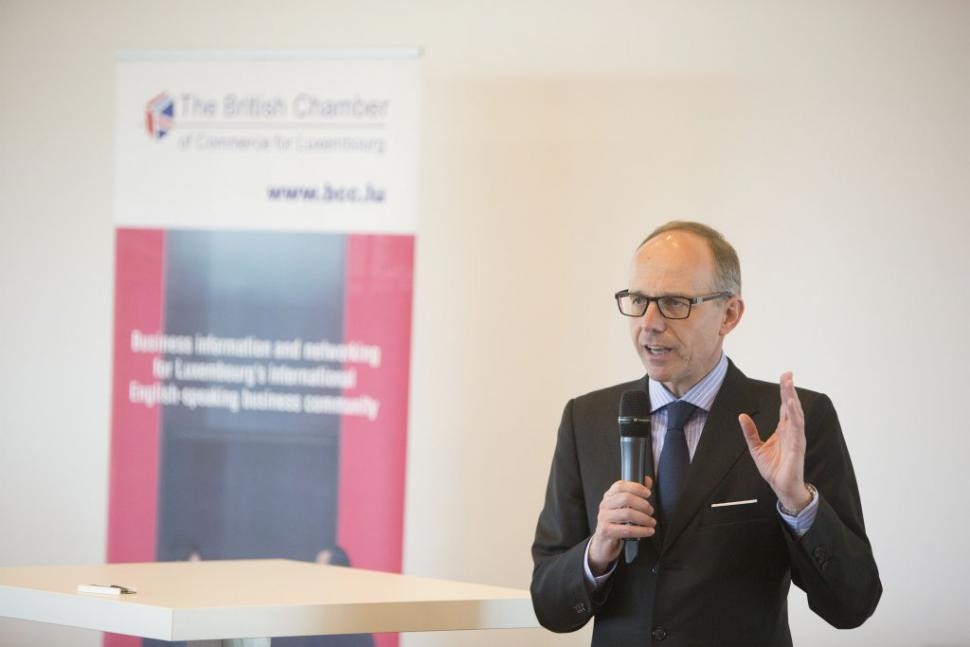Frieden insisted that a functioning EU was central to Luxembourg’s prosperity at an event co-organised by Amcham and the British Chamber of Commerce on Monday.
Frieden, who is now partner at the Elvinger Hoss Prussen law firm and chairman of BIL, insisted that:
“Without the success of Europe, Luxembourg cannot be successful. Europe is and must remain part of Luxembourg’s DNA.”
However, he argued that reform was needed, and that Europe should focus on cooperation and further integration in policy areas which bring real added value to its member states, echoing Mario Monti’s suggestions from last week on the future of the EU.
Frieden also stated that the single market should be deepened and completed, as it would bring more cross-border trade, which is still low in the EU, especially for SMEs.
A coalition of the willing for further integration
Talking of Brexit and referring implicitly to European Commission president Jean-Claude Juncker’s white paper scenarios, he was in favour of a Europe of circles:
“We would have three or more circles. The first group of countries would do a lot in common, not just economically, but also politically: justice and police collaboration, energy and climate. The second circle could be those that merely see Europe as a single market. The third circle would be the closest allies and friends of the EU, such as the UK and Switzerland. We should not forget, that we have been discussing for years with our friends in Switzerland. We should not discriminate one friend against another. Outside the EU, we must define much more in common who our real allies are. Our relations with the US must remain a key priority.”
Frieden mapped out further integration in the Eurozone towards a fiscal and economic union, in accordance with most economic theories:
“If we want the Eurozone to succeed, we need to move, within this first core Europe, to a more Europeanised, and even federal system, including control mechanisms at the level of the European Parliament. A monetary union cannot function without a fiscal and economic union and therefore without political union. This may not be very popular, but it is key to achieve success in the Eurozone in the future, and avoid crises.”
He also advocated that Luxembourg should assume an active leadership role in any future integration negotiations.
Campaigning already for 2018?
While he insisted that he was not running an electoral campaign, Frieden nevertheless laid out some very specific policy proposals which resonated very well with the international audience. Lower corporate and personal taxes to make Luxembourg more attractive to investors, fiscal discipline, and increased competitiveness rankings were essential to ensure Luxembourg’s successful future.
Luxembourg’s past performance was not a guarantee for success, he argued:
“Our advantages are not huge in a globalised economy so, next to taxation, we should make sure that in competitiveness rankings, we go up a bit. I want us to be on top of those lists- it’s not enough to move up one place. In the ranking by the World Economic Forum, Switzerland and Singapore are first, and the Netherlands is ahead of us. These are highly developed countries, so let’s compare ourselves to them and make sure that in the future we rank among the top three.”
This contrasted markedly with current finance minister Pierre Gramegna’s humorous statements on 27 February that it was nice being the second most important financial centre in Europe after London:
“It’s also nice to be number two sometimes. If you’re number one you’re being criticised. We used to have the highest purchasing power per capita in the world and recently Qatar became number one. What a relief! Everywhere you’re being told you’re the richest country in the world: you can pay. Once you’re second nobody’s paying attention anymore. With the lower oil prices, I’m told we’re back to being number one. I’m really worried.”
National policy proposals
Frieden then moved on to domestic policy proposals, such as strengthening the use and learning of English, increasing the offer of international schools, massive construction of social housing, and maintaining social cohesion.
He proposed a few ground breaking reforms of the civil service: a tracking system for your files in the public administration system, and more importantly, that there should be a back and forth between the public and the private sector.
“People from the public sector could sometimes work in a private company and move back and the other way around as well.”
Frieden summarised his presentation:
“I wish we would exercise leadership in creating a Europe that is, at least at its core, deepened, to some extent more federal, that we identify the issues where Europe brings real added value. Secondly, that we build a real relationship of partnership and friendship with the UK. Third, we should not forget where our real allies are--those who share our values- and that is in particular the USA. Fourth, success doesn’t come on its own, we must not rest on past successes. We must identify those issues where we could and should be better than our neighbours--only then will we have a guarantee of success in the future which I wish to all of us.”
